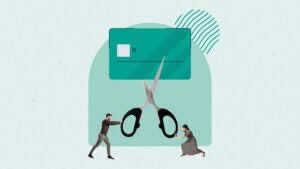Breaking the generational cycle of debt



Debt can come from anywhere and can happen to anyone. Juggling multiple debt payments and relying on credit cards can feel like a seemingly endless circle of payments and interest. It can also be a part of a cycle that spans generations.
The generational debt cycle is a pervasive one. A lack of financial education, seeing family members grapple with debt and familial spending habits can all contribute to how you manage money. These influences can also impact how you can get into and manage debt yourself.
While debt isn’t something to be ashamed of, breaking the cycle of debt can help you secure a stronger financial future for yourself.
How debt can be a generational problem
Your attitudes, habits and access to and around money don’t occur in a vacuum. The environment you grew up in can shape how you view debt and finances, which also impacts the financial decisions you make later in life.
Generational wealth, education and other factors can all play a role in how your debt impacts you – often in ways that may surprise you. Knowing what these factors are and how they can impact your finances can help you break from the cycle for good.
How generational debt can impact financial outcomes
Debt, when not handled properly, can become a vicious cycle. One credit card balance can quickly balloon with high interest and fees. The monthly payment – even a minimum one – can prevent a family from building an emergency fund, saving for retirement or college or building generational wealth.
This generational wealth is a key part of how families help members grow their money. Parents who are able to save for a child’s education can help their children avoid or mitigate student loans.
More adult children are relying on their parents’ financial help to cover housing costs or emergency expenses. More than one in ten (14 percent) of first-time homebuyers surveyed by Bankrate relied on financial aid from friends and family for their mortgage down payment.
Debt can also impact the assets you might receive in an inheritance. When someone with credit card debt or a mortgage dies, their creditors are first in line to receive money from the estate – even if it means selling the house, car or other assets to pay the balance.
Without this financial help, the next generation can find it difficult to pay for their own expenses when they move out or have to take on more debt themselves.
How generational financial illiteracy impacts families
A lack of financial literacy can cost you thousands of dollars each year. Unfortunately, a lack of financial education is often one of the biggest drivers of the generational debt cycle.
Family and friends are one of the top sources for money advice, with nearly half of Americans surveyed by Bankrate reporting their loved ones as a source of financial advice.
Well-meaning family members, however, can still be prone to handing out bad advice – or not educating you about finances at all. Parents who don’t have the money talk with their children can set them up for financial failure in the future, especially as only 28 states of America require high-school students to take a course in economics.
Well-meaning relatives may advise you to avoid credit cards or debt altogether. However, a well-managed credit account can help you build your credit score, or a loan could allow you to invest in your education or building equity.
Even financially literate family members may supply outdated advice. Someone who last purchased a house in 1990 may not be aware of the rules and protections put in place after the 2008 financial crisis or that mortgages with a down payment of less than 20 percent require private mortgage insurance.
Without a solid financial education from their family, many may find themselves taking on bad debt, misunderstanding how their credit card balance works or seeking out advice from inaccurate sources.
How generational spending habits influence financial wellbeing
Your family’s money habits can influence how you manage your own budget. From a young age, children can observe their parents’ financial approach and how it impacts their day-to-day lives. Family finances can also determine what standard of living people are comfortable with when they are adults.
If you watched your parents sit down and go over their budget every month, it’s a habit you may have picked up and now incorporate into your own life.
Maybe your family didn’t have a budget or didn’t stick to one. If your family relied on credit cards, payday loans and other forms of debt to afford their expenses, it can seem like a normal and natural thing to do when it comes time for you to manage your finances.
Money habits like social spending, living paycheck to paycheck or taking on debt to pay for non-essential expenses are all habits families can learn from generation to generation and can lead to financial issues and a heavy debt burden down the road.
The impact of generational financial trauma
Financial stress in your family can impact more than your savings. It can also impact how you view money and build wealth.
According to a 2023 study by Experian, 68 percent of United States adults report they’ve undergone or were experiencing financial trauma. This trauma contributed to feelings of stress, negative thoughts about finances and anxiety when thinking about money.
Living in a family undergoing financial trauma can impact the way you feel about your own finances. A 2018 study in the North Carolina Medical Journal found that childhood poverty contributes to worse economic outcomes for those who have experienced it, including a lower educational level.
Growing up in a family facing trauma, such as not being able to afford basic necessities or facing a loss of housing can impact how you view money and debt. Living in a poverty mindset can make you averse to risk – to the point where you avoid investment and other ways to build wealth.
How to break the generational cycle of debt
Breaking the generational cycle of debt takes time, healing and education. You will need to address the cause of the debt and the root of your financial habits. Then, you’ll be able to build a more financially sustainable future for yourself and your family.
Educating yourself
Learning how to manage your finances and build healthy money habits is one of the first steps in breaking the generational debt cycle.
Having the knowledge to make informed decisions about your finances can give you the tools you need to pay down debt, build wealth and educate the next generation about money.
There are several places where you can learn about financial management:
- The Consumer Financial Protection Bureau (CFPB) offers online resources for budgeting, paying off debt and knowing your rights as a financial consumer, as well as fulfilling your financial goals such as buying a house.
- The Financial Literacy and Education Commission, which runs MyMoney.gov, can also be a good place to start if you want to learn the basics of money management. There, you can access how-to articles, explainers and tools such as payoff calculators and budget worksheets.
- Free financial advising and planning services may also help. The Foundation for Financial Planning, for example, offers pro bono financial planning for those in need, which can offer more individualized advice and guidance for your situation.
- Bankrate offers free articles and courses on personal finance and financial literacy for those with a variety of backgrounds and economic situations.
Addressing financial trauma
Acknowledging the financial trauma you and your family have experienced can help you get to the root of your financial habits and build a healthier framework for managing your money.
Firstly, know that being in debt doesn’t mean that you’re a bad person or that you’re doomed to bad financial decisions for the rest of your life. Debt, after all, can happen to anyone regardless of background or education.
Acknowledging your feelings and anxieties around money and debt as valid can help you accept the impact financial trauma has had on your life. It’s also important to manage the impact that money stress can have on your life.
Letting go of the guilt around spending money – even when you’re in debt – can also help you manage your mental health. While buying a coffee or attending a class might seem like nonessential expenses, the gain you get from allowing yourself to enjoy what matters to you can go a long way.
Finally, consider speaking to a professional about your financial trauma. A therapist specializing in financial therapy can help you manage your feelings around your finances and address your anxieties about money.
Reducing your existing debts
Paying down your debt can help relieve some of the stress and financial burden you’re feeling. It can also help you learn good financial habits that can set you up for success later down the line.
The first step is setting up a budget, which will help you determine how much you can contribute toward your payments after covering your essentials. Ideally, you want to be making more than the minimum payment in order to save on interest and pay off your loan more quickly.
Next is to find a debt repayment plan. Using a plan such as the snowball or avalanche method will focus your payments in a way that can save you on interest, allowing you to prioritize and maximize the impact of your payments.
Once you have a payment plan, you can use a debt payoff calculator to see when you can expect to pay off your loan. Having a timeline will give you a goal to work towards and remind you that there is an end in sight.
What if you don’t see an end in sight? If you feel overwhelmed by the amount of debt you’re in, or if you’re struggling to make the monthly payments, you may want to consider debt relief.
A debt relief company like National Debt Relief can help you escape the seemingly endless cycle of debt by reducing your payments and the amount you owe. This way, you can set up healthier financial habits and get a fresh start, debt-free.
What next?
Generational debt can pose a challenge to you and your finances. Overcoming a lack of education, addressing the money habits you may have learned and confronting the financial trauma you may have been through isn’t easy, but it is worth it to build a better financial future for you and your family.
If you want to learn more about managing your finances, your mental health and your debt repayment plan, check out Bankrate and National Debt Relief’s ongoing article series about all things debt. Watch this space for tips, tricks and exclusive stories from readers like you and their debt repayment journeys.
Why we ask for feedback Your feedback helps us improve our content and services. It takes less than a minute to complete.
Your responses are anonymous and will only be used for improving our website.






